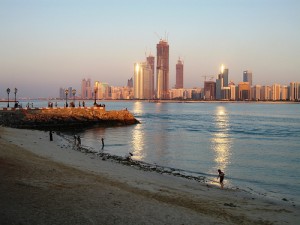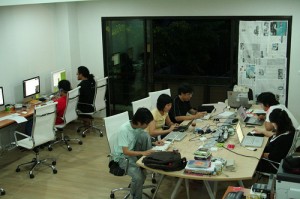
One of the most modern trade and finance centers in the world – Singapore
Mongolia may not be on everyone’s must see list, but as an expat destination it is increasingly popular. The capital, Ulaanbaatar (Ulan Bator or “UB”) is attracting increasing numbers of expats to its streets.
There aren’t many statistics on Mongolia’s population and even fewer to predict future population trends. However, the 5,000 expatriates who currently live in the capital suspect that this unlikely city will see an sharp increase in expat population over the next five years.
Why are all these expats attracted to Mongolia? Aside from the beautiful landscapes and rich culture the key is the country’s rapidly expanding economy. This “boom” is especially evident in the area of mining.

On average, only 10% of online job searches are successful.
Conventional wisdom holds that only 10% of internet job searchers are successful. Concentrating exclusively on online job boards means you have almost no chance of getting hired.
And though there’s not a lot of research on the subject, odds are probably even worse for expats.

A shortage of qualified retail bankers in GCC countries like Abu Dhabi could mean opportunities for expats.
Retail banks in GCC countries like the UAE and Abu Dhabi face a shortage of qualified staff, even as they try to expand regionally. According to a Reuters report, they are struggling to find and retain qualified talent, since many locals prefer to work either government or investment banking jobs.
Could this lead to an upswing in expat employment?

Bahrain has extended a freeze on expat labor fees to stimulate its economy.
Expats working in Bahrain are subject to special fees, which of course make life difficult for private business whenever they rise. The fees were initially frozen back in April, when the government hoped to offset the damage two months of social unrest did to the economy.
On Sunday Bahrain’s cabinet agreed extend that freeze till April 2012 , according to a report by Habib Toumi on gulfnews.com. Bahrain’s Prime Minister also asked for a full review of the fee structure and recommendations for future policy.

Many expats are finding jobs hard to come by in big Asian cities such as Shanghai, forcing them into "second-tier" cities and positions.
There’s no doubt the world’s hottest economies are in Asia. Countries like China, Thailand, Singapore and Indonesia feature higher growth than developed nations and greater political stability than the emerging economies of the Middle East.
A piece by Sarah Mishkin in yesterday’s Financial Times explores the glut of expat workers moving east–a trend which has picked up tremendously since 2008. Contrary to popular belief, however, it’s not as if firms are handing contracts to every foreigner who shows up with a nice-looking CV.
Writes Mishkin:
Cultural and linguistic skills remain crucial – even more so given the growing importance of domestic growth in China and south-Asian countries. Many companies looking to expand on mainland China are now focused on its so-called second and third-tier cities, which may have more residents than Paris but with which few foreigners are familiar.
Asia’s fast growth is also luring back those from the region who had moved to the US or Europe to study and work. Such so-called returnees are the most sought-after employees, as they not only know the nuances of the local market but are perceived as cheaper to hire than someone from abroad and easier to retain.
So what’s the best strategy for an Asian job search?

Australian job growth is slowing, though unemployment remains much lower than in other developed countries.
Australia’s troubled job market is in for more pain, according to an article by Colin Brinsden in the Sydney Morning Herald. The land down under has advertised for 20% less jobs in the past year, with a seasonally-adjusted dip of 1.5% in September alone.
David de Garis, Senior Economist for National Bank Australia, commented:
This further deterioration in classified advertising of skilled vacancies in September is another reminder that employers have continued to cut back on recruitment […] Relatively flat profits, rising nominal wage costs and weaker underlying productivity is a recipe for further soft labour market outcomes in the months ahead.

Singapore is eager to attract expat talent in its technology sector.
Singapore is well-known as one of the top expat destinations in the world, for both career prospects and family life. Now the company is looking to target the technology sector, particularly innovative expat entrepreneurs. According to a recent CNN Money piece by Katherine Ryder:
Singapore’s new pet project is creativity. The country has long had its eyes on Silicon Valley and over the last decade it has implemented plans to more or less recreate the California tech scene in Southeast Asia. At first, Singapore attempted to throw billions of dollars at venture capitalists and private equity firms. Then, seeing too little of that money trickling down to startups, it began funding them more directly. In its latest scheme, the government plans $50 million of direct investment in 100 companies over five years.

An expat who thought she had a job at a Thai company got a nasty surprise…
It should come as no surprise to any expat job seeker that hiring practices can vary wildly across cultures. An instance of confusion came up recently in a letter to the Career Clinic column in Thailand’s Bangkok Post.
The expat in question was a woman who had lived in Thailand for six years. She was working for a company (we’ll call it Company A) and applied for a job at Company B. Company B seemed very interested in her, emailing her back immediately and repeatedly following up by phone. Eventually Company B offered her the job and suggested a start date. She accepted.

